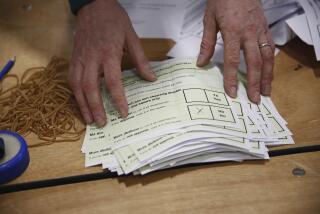Massive Protestant Rally Decries British-Irish Pact
- Share via
BELFAST, Northern Ireland — Tens of thousands of Protestants staged one of the biggest demonstrations in Northern Ireland’s history Saturday to protest an agreement that gives the mainly Roman Catholic Irish Republic a formal role in the province.
The agreement, signed nine days ago between Britain and Ireland, is aimed at reducing the level of violence between Protestants and the Catholic minority here, violence that has claimed about 2,500 lives in the last 16 years.
The huge crowd, variously estimated at between 5% and 10% of Northern Ireland’s entire Protestant population of 900,000, pressed into Belfast’s main downtown square and surrounding streets to hear their political leaders denounce the accord and watch them sign an oath to resign their seats in the British Parliament to fight it.
Paisley Sees Betrayal
“The heart of Ulster has been shattered by the darkness of betrayal,” boomed Free Presbyterian minister Ian Paisley, the most outspoken of the province’s Protestant leaders and head of the mainly Protestant Democratic Unionist Party.
“Our inalienable right to equality of citizenship has been signed away to Dublin,” he told the cheering crowd, adding, “We will not have Dublin rule.”
Heavily armed police wearing bulletproof jackets and numerous British army patrols monitored demonstrators as they headed to and from the city center. Army helicopters circled overhead.
In some places, 20-foot-high canvas screens were erected as temporary barriers to prevent direct contact between Protestant marchers and local residents in Catholic neighborhoods.
The Anglo-Irish Agreement gives the Irish Republic the right to put forward views and proposals on issues affecting the British-ruled north, but Britain’s Prime Minister Margaret Thatcher has insisted that she relinquished no sovereignty over the province.
At one point, Paisley held up a letter written by Thatcher repeating this assurance, then dramatically ripped it up and threw the pieces into the stiff autumn wind as the crowd applauded.
Giving the Irish Republic a role is aimed at boosting the confidence of Catholic moderates in Ulster, as Northern Ireland is also known, in order to diminish support for extremists, including the outlawed Irish Republican Army.
However, Protestants see the accord as the first step toward a transfer of Ulster to the Irish Republic, a step that they are convinced would destroy both their religious and political freedom.
Parliament Vote Due
The Irish Parliament ratified the agreement last Thursday. It will take effect when the British Parliament gives its expected approval later this week.
Several Protestant members of the British Parliament signed a pledge to resign their seats before the new year, then contest reelection on the agreement issue.
The decision follows Thatcher’s rejection of Protestant demands to submit the agreement to a vote in Ulster.
While the accord has bipartisan support in mainland Britain, and a poll published Saturday in Dublin indicated that nearly 60% of those in the republic favor it, Northern Ireland’s Protestant majority would almost certainly vote down any plan that forced them to give up a share of their political power to the Catholic minority.
Longstanding Dispute
Finding some formula acceptable to the Protestants that would also give Catholics at least some share of power has been seen as the elusive key to solving the age-old enmity between the two communities.
The size, the mood and the composition of Saturday’s protest rally would appear to indicate more extensive opposition to the agreement than Britain or the Irish Republic had expected.
The rally was the largest since Protestants assembled in the same city in 1912 to oppose British plans to grant independence to a united Ireland, including Ulster.
That protest succeeded, and Northern Ireland remained British when the rest of Ireland was given independence in 1921.
A majority of those attending marched to the city center under banners of the many Protestant clubs, lodges and orders whose powerful influence in the Protestant community have tended in the past to shape a strong, collective reaction to events.
‘Ulster Says No’
Many also came on their own or with their families, wearing badges declaring, “Ulster Says No.”
Some said they had not protested before on any political issue but felt compelled to voice opposition to the agreement.
“Thatcher is a traitor! Ulster is not for sale!” shouted one woman.
A dignified-looking, gray-haired woman stated: “Our status has been changed. A foreign government now has a role here, and that isn’t right.”
How much the weariness of 16 years of violence, record high unemployment and Thatcher’s own formidable determination will blunt Protestant Ulster’s opposition remains unclear.
The hourlong rally began with the hymn, “O God, Our Help In Ages Past” and broke up peacefully with the British national anthem and the burning of an Irish tricolor flag.
Although Paisley supporters physically attacked a British Cabinet member in Belfast last Wednesday during a protest against the agreement, he and other Protestant leaders repeatedly appealed to the crowd Saturday to return home peacefully.
More to Read
Sign up for Essential California
The most important California stories and recommendations in your inbox every morning.
You may occasionally receive promotional content from the Los Angeles Times.













